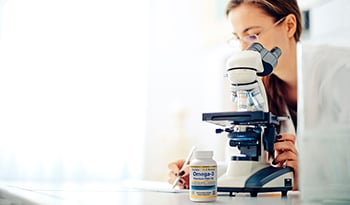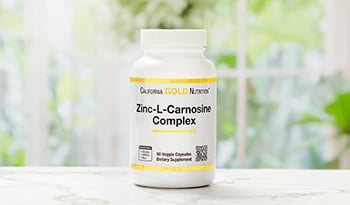Multivitamins: Why You Need These Beneficial Ingredients + 10 Ingredients to Avoid
DISCLAIMER:This blog does not intend to provide diagnosis...
- In this article:
- What Are Essential Vitamins and Minerals?
- 10 Ingredients To Avoid in Your Multivitamin
- How to Choose The Right Multivitamin for You
- Look for Quality Certifications

There is no question that the entire human body functions best when it has a steady supply of high-quality nutrition. A deficiency of any nutrient has profound effects on the human system because the body is a complex system dependent upon the proper functioning of many interdependent systems.
A high potency multiple vitamin and mineral supplement should provide the 13 vitamins and 14 minerals needed in proper amounts each day for your tissues and organs to do their jobs. Although needed only in relatively small amounts, these essential vitamins and minerals are crucial for the manufacture of body tissues and the activity of enzymes—molecules involved in speeding up chemical reactions necessary for human bodily function.
What Are Essential Vitamins and Minerals?
The term "essential" signifies that our body cannot produce these compounds. We must rely on food or supplemental sources.
Essential vitamins and minerals are required for specific biochemical reactions or body processes to occur. Taking a multiple vitamin and mineral formula that provides the Recommended Dietary Allowance (RDA) or Recommended Dietary Intake (RDI) can act as an insurance policy that your intake of these essential nutrients is sufficient.
Vitamins
- Biotin is widely known to increase the strength of nails and promote healthy hair. It also functions in the manufacture and utilization of fats and amino acids.
- Choline performs a vital function in the proper metabolism of fats and amino acids. Choline is also required to make the critical neurotransmitter acetylcholine and principal components of our cell membranes, such as phosphatidylcholine (lecithin) and sphingomyelin.
- Niacin is one of the essential molecules in the human body. It is involved in many cellular processes, including energy production, cellular repair, DNA repair, and optimizing overall cellular function.
- Pantothenic acid plays a critical role in utilizing fats and carbohydrates in energy production and the manufacture of adrenal hormones and red blood cells.
- Riboflavin functions in two vital enzymes involved in the production of energy.
- Thiamin is essential for energy production in every cell of the body, especially in the heart and brain.
- Vitamin A is necessary for proper visual function, immune system activity, growth and development, reproduction, and integrity of the skin and mucous membranes.
- Vitamin B6 is involved in the formation of proteins and structural compounds, chemical transmitters in the nervous system, red blood cells, and maintaining hormonal balance and proper immune function.
- Vitamin B12 works with folic acid in synthesizing DNA, red blood cells, and myelin sheath.
- Vitamin C helps our body manufacture collagen, the primary protein substance of the human body. It is also critical to immune function.
- Vitamin D stimulates the absorption of calcium and is critical to proper immune function.
- Vitamin E functions primarily as an antioxidant or protection against damage to the cell membranes.
- Vitamin K is well-known for manufacturing clotting factors and is necessary for building healthy bones and proper immune function.
Minerals
- Calcium is the most abundant mineral in the body. In addition to its major function of building and maintaining our bones and teeth, calcium also helps many enzyme reactions in the body. The contraction of muscles, release of neurotransmitters, and regulation of the heartbeat are all dependent on calcium.
- Chloride works with sodium and potassium as an electrolyte in water balance and distribution, acid-base balance, muscle and nerves, blood pressure, and heart, kidney and adrenal function.
- Chromium functions in the body as a vital constituent of the "glucose tolerance factor." Chromium works closely with insulin in facilitating glucose uptake into cells, making it useful in helping support proper glucose metabolism.
- Copper is required for proper iron absorption and utilization. Copper is also needed for the crosslinking of collagen and elastin to give connective tissue its integrity. It is also critical for adequate cholesterol levels and immune function.
- Iodine is required in the manufacture of thyroid hormones.
- Iron plays a central role in the hemoglobin molecule of red blood cells (RBC). It transports oxygen from the lungs to the body's tissues and carbon dioxide from the tissues to the lungs. Iron also works in several key enzymes in energy production and metabolism, including DNA synthesis.
- Magnesium activates many enzymes in the body. Magnesium deficiency is widespread. Symptoms of magnesium deficiency include fatigue, depression, irritability, weakness, heart disturbances, muscle cramps, insomnia, and a predisposition to stress.
- Manganese helps with blood sugar control, energy metabolism, and thyroid hormone function. Manganese also functions in the antioxidant enzyme superoxide dismutase or SOD.
- Molybdenum is involved in alcohol detoxification, uric acid formation, and sulfur metabolism.
- Phosphorus works with calcium to promote bone health.
- Potassium is an electrolyte that functions in maintaining many body functions, including water balance and distribution, acid-base balance, muscle and nerves, blood pressure, heart, kidney, and adrenal function.
- Selenium works with vitamin E in preventing free radical damage to cell membranes.
- Sodium functions with chloride and potassium as an electrolyte in water balance and distribution, acid-base balance, muscle and nerves, blood pressure, and heart, kidney, and adrenal function.
- Zinc is especially important to proper immune function, wound healing, sensory functions, sexual function, and skin health.
10 Ingredients To Avoid in Your Multivitamin
Many popular multivitamins found in drug stores or supermarkets are touted as “recommended by physicians and pharmacists”, but are low in key essential nutrients and contain artificial additives.
Here are a few ingredients listed on labels of some of the best-selling multivitamins that have no beneficial reason for being in any dietary supplement:
1. Synthetic Vitamin E
Synthetic vitamin E (d,l-alpha-tocopherol, or -tocopheryl) is a cheap unnatural form that may interfere with the body's utilization of the natural d-alpha forms of vitamin E.
2. Synthetic Beta-Carotene
Synthetic beta-carotene is much different in chemical composition than natural sources of beta-carotene, such as if from Dunaliella algae.
3. BHT
Butylated hydroxytoluene, or BHT, is a synthetic antioxidant used to prevent the loss of vitamin E and beta-carotene.
4. Corn Starch
Pregelatinized corn starch from GMO-derived corn is used as a binding agent to hold the tablet together.
5. Hydrogenated Palm Oil
Hydrogenated palm oil is a chemically altered fat used as a lubricating agent. In 2015, the U.S. Food and Drug Administration (FDA) determined that these sorts of fats are no longer Generally Recognized As Safe (GRAS) when used in foods. However, for some reason, some companies still use hydrogenated palm oil in dietary supplement tablets.
6. Polyethylene Glycol
Polyethylene glycol is a petroleum-based compound mixed in with the bulk material before tableting so it can flow better in the machinery.
7. Stannous Chloride
Stannous chloride is added to prevent the tablet from changing color.
8. Talc
Talc, yes, that is right, talcum powder is used to improve the flow of the material through the tableting process and allow for better compression of compounds into the tablet.
9. Titanium Dioxide
Titanium dioxide is used to absorb moisture and/or to produce whiteness and opacity to a tablet. Titanium dioxide is banned in Europe because it has been shown to cause toxic effects to genetic material.
10. Yellow 6 Lake
Yellow 6 Lake is FD&C Yellow # 6 Aluminum Lake, an artificial color used to impart a reddish-yellow hue to the tablet and no other purpose.
How to Choose The Right Multivitamin for You
The ingredients above are just some of the issues you may find with multiple vitamin and mineral products. Fortunately, many quality manufacturers of dietary supplements avoid cutting corners with cheap ingredients and excipients. If you see a compound on the label that you are not sure of, look it up on iHerb or a preferred search engine.
Another issue that is important to address is products that fail to meet label claims. It has been an issue that has popped up repeatedly over the years. In general, established brands utilize what is known as "good manufacturing practices" or GMPs to work hard at meeting label claims. The problem is almost always seen in companies of no real substance.
Look for Quality Certifications
When looking for a multivitamin or any other supplement for that matter look for quality certifications.
iHerb addresses quality control in dietary supplements by offering products that are only from brands that employ Good Manufacturing Practices. Many dietary supplement manufacturers are also certified by organizations with strict guidelines like NSF® (National Science Foundation), USP® (United States Pharmacopeia), UL® (Underwriters Laboratories), and ISURA®.
iHerb goes even one step further in practicing transparency through a testing program called iTested. Each product with the iTested logo has been:
- Tested by a certified 3rd party independent laboratory for ingredients, purity, and label compliance.
- Offers complete transparency by offering a verified report.
- Allows quality assurance, authenticity, and product guarantee.

 By Dr. Michael Murray, N.D.
By Dr. Michael Murray, N.D. 


